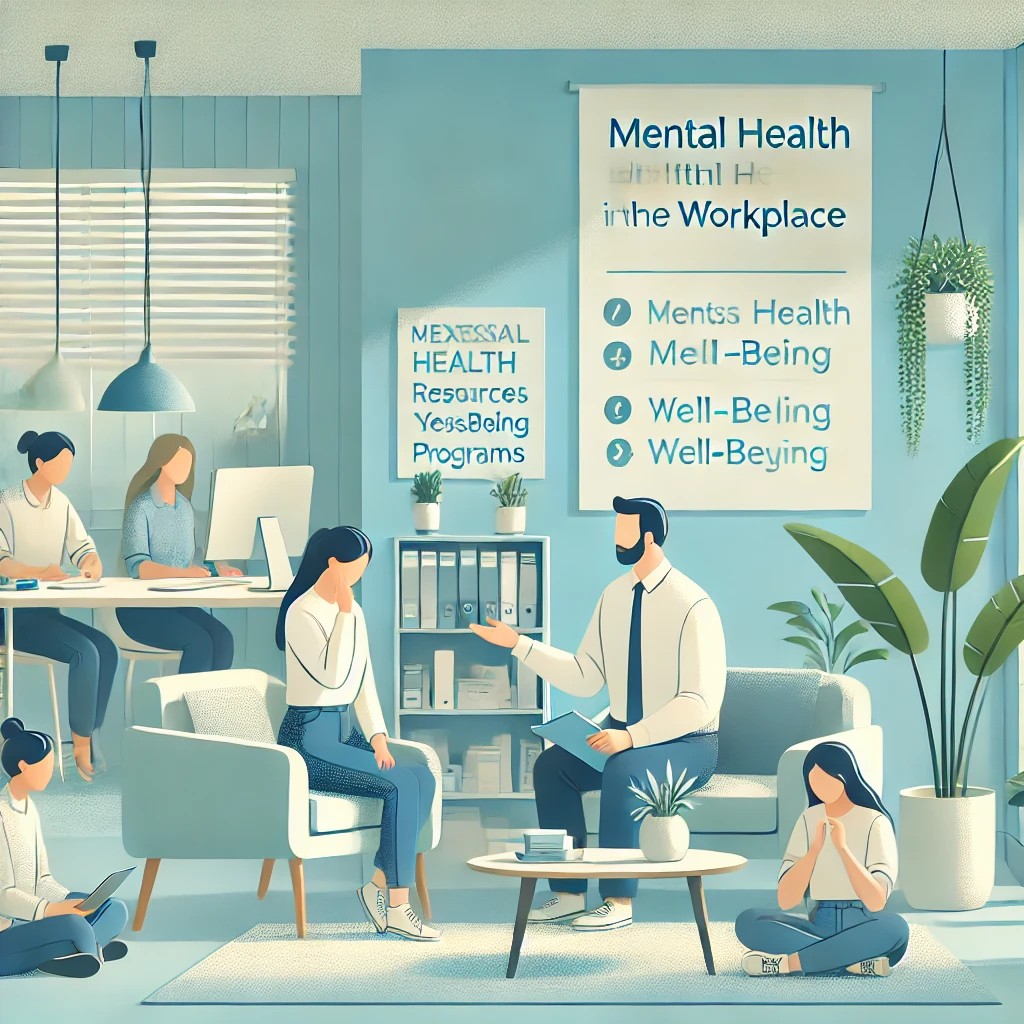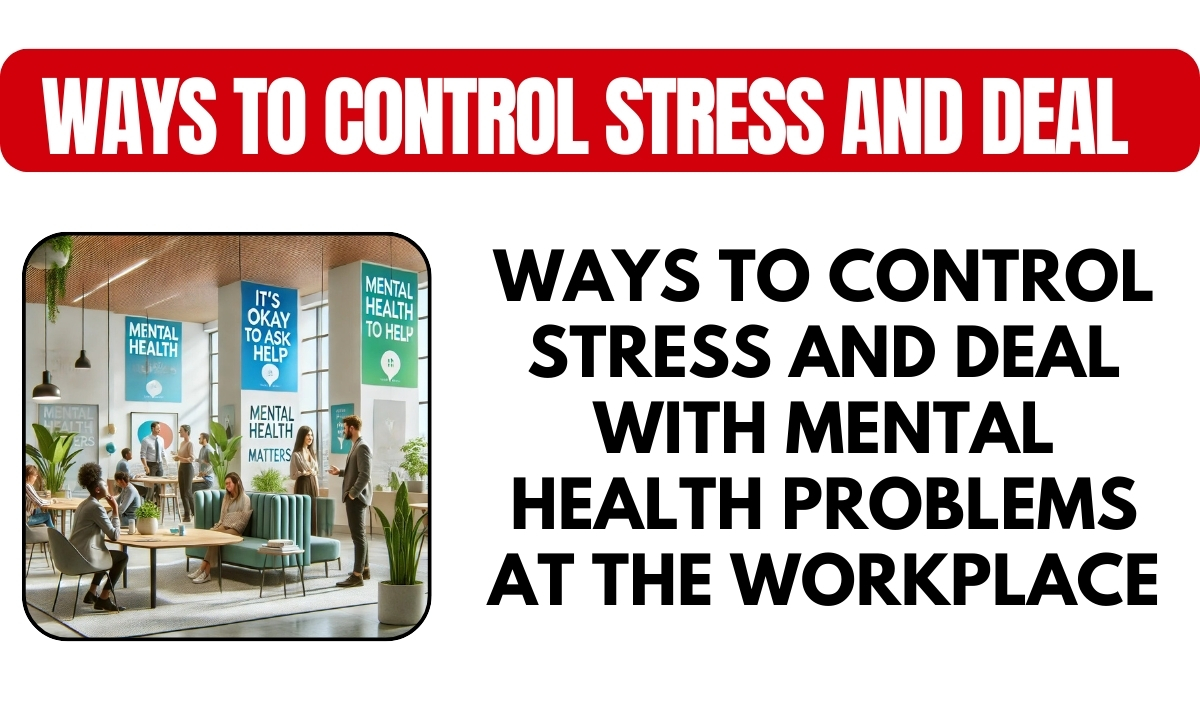|
|
|
|
Mental health is one of the most crucial issues in the present time where every individual is struggling through stress and other health concerns. For a healthy well-being of a person mental stability is one of the most significant factors. World Mental Health Day is celebrated every year on October 10th to spread awareness regarding problems associated with it. Nowadays, issues related to mental health are arising in workplaces. The toxicity and workplace environment plays a major role in an individual’s life as most of the time is spent in the workplace.
As workplace stress and mental health concerns continue to rise, experts emphasize the importance of creating supportive environments to mitigate the impact. To combat this, leaders and mental health professionals advocate for simple yet effective strategies of regular check-ins, mindfulness practices, time management, and open communication.
To deal with mental health problems here are ways to control stress and deal with mental health problems at the workplace by Dr. Chandril Chugh Senior Neurologist and Director of Dr. Good Deed which are as follows-
- Prioritize Time Management: Break tasks into manageable parts set realistic deadlines, and prioritize what needs immediate attention. Avoid multitasking, which can increase stress.
- Take Regular Breaks: Step away from your desk, stretch, or go for a short walk. These breaks help reset your mind and improve focus.
- Practice Mindfulness: Techniques like deep breathing, meditation, or even short mindfulness exercises during the day can reduce anxiety and enhance emotional balance.
- Seek Support: Talk to a colleague, supervisor, or mental health professional if workplace stress becomes overwhelming. Many companies offer Employee Assistance Programs (EAPs) for counseling and support.
- Set Boundaries: Avoid overworking by setting boundaries on availability after work hours. Ensure a healthy work-life balance by maintaining personal time and hobbies.
- Maintain Healthy Habits: Regular exercise, a balanced diet, and adequate sleep are essential for managing stress and mental health.
- Cultivate a Positive Mindset: Focus on accomplishments rather than setbacks, and try to maintain a positive outlook despite challenges.

India faces a significant mental health burden, with 15% of the population affected by mental health disorders, largely due to workplace pressures, according to a 2023 WHO report. Key factors contributing to work stress include long working hours, job insecurity, and lack of work-life balance. To combat this, companies can create supportive environments by offering flexible working hours, regular breaks, Employee Assistance Programs (EAPs), and mindfulness workshops incorporating yoga and meditation. Promoting open communication and reducing stigma around mental health is crucial, as 60% of Indian workers hesitate to discuss mental health issues at work.
By addressing this stigma and ensuring better access to mental health care, companies can improve employee well-being, and productivity, and create healthier workplaces, said Rashmi Shetty, Psychology Counsellor.
“Small Gestures, Big Impact: Supporting Colleagues’ Mental Health. In today’s fast-paced work environment, simple human gestures can make a significant difference in colleagues’ mental well-being. Leaders can promote mental health by taking four key steps: ask with genuine concern (“Are you okay?”), listen openly and patiently, encourage reflection on coping strategies, and follow up to show care. By prioritizing empathy and understanding, leaders can build a culture of well-being, resilience, and productivity, making colleagues feel valued and safe.
These everyday moments of kindness complement formal initiatives and can have a profound impact on colleagues’ mental health and overall well-being”, said Anish Singh, Co-founder of ATP HR Tech Pvt Ltd.
Effective stress management and mental wellness in the workplace require a multifaceted approach. Key strategies include practicing time management, taking regular breaks, building supportive relationships, using relaxation techniques like deep breathing, mindfulness meditation, and progressive muscle relaxation, and seeking professional help when needed.
It can improve stress management, mental health, and work-life balance, ultimately benefiting overall productivity and organizational morale, said Dr. Kunal Kumar, HOD- Department of Psychiatry, Shardacare- Health City.
One can get a hold over their work stress by following these 3 R’s:
- Respecting your own boundaries: Although it sounds simple but can be a bit challenging to execute, one must learn to say ‘no’ to unrealistic workload or take a stand for themselves when they feel exploited at work.
- Realistic Deadlines: While the deadlines are always yesterday, one must always be clear about the time it will take to execute the work along with some wiggle room for mistakes.
- Reinforce: While we all innately be too harsh on ourselves during our mistakes, we always fail to reward ourselves for our success. Let’s change that, celebrate your small and big success, and give yourself a treat, you deserve it.
By simply following these three R’s one can find themselves less stressed about their work, said Parth Gupta, Psychologist Specializing in Behavioral and Clinical Psychology.
Effective workplace stress management and mental wellness strategies and setting boundaries to avoid overworking and maintain a healthy work-life balance are also crucial. Maintaining healthy habits such as regular exercise, a balanced diet, and adequate sleep, and cultivating a positive mindset by focusing on accomplishments rather than setbacks, can significantly reduce stress and anxiety.
Implementing these strategies can improve overall well-being, productivity, and job satisfaction, leading to a healthier and more resilient workforce, said Dr. Chandril Chugh Senior Neurologist and Director of Dr. Good Deed.

Stress-less strategies to start a productive day include arriving 10 minutes early, practicing deep breathing (6-4-7 pattern), and fueling up with a low-carb, high-protein breakfast. Throughout the day, take 5-minute breaks, prioritize challenging tasks, and observe stress triggers. Utilize affirmations, permission to make mistakes, and nootropic coffee to boost productivity. These habits help:
- – Balance breath and nervous system
- – Boost confidence and focus
- – Increase productivity and creativity
- – Reduce stress and anxiety
- – Improve overall well-being
Implementing these strategies can significantly enhance mental and physical health, leading to a more resilient and productive you, said Vidya K, Holistic Psychologist, Hypnotherapist, Somatic and Energy Coach.
Manage Work Stress with Simple Daily Changes” This World Mental Health Day, prioritize your well-being by incorporating five practical tips into your daily routine. Start by identifying your stress triggers, then practice “box breathing” for calmness. Accept that stress is a normal part of work, unplug after work hours to fully unwind, and practice yoga daily for mental clarity and physical relaxation. By implementing these habits, you’ll increase resilience, reduce stress and anxiety, and boost productivity. This, in turn, will improve your mental health, enhance work-life balance, increase decision-making capacity, and boost overall well-being.
Prioritize your mental health and transform your work experience into a fulfilling and balanced one. said Saurabh Bothra, CEO & Certified Yoga Instructor, of Habuild.
This World Mental Health Day, prioritize your well-being with simple daily changes to your routine. By acknowledging the issue and taking proactive steps to foster a culture of well-being, productivity, and resilience.
